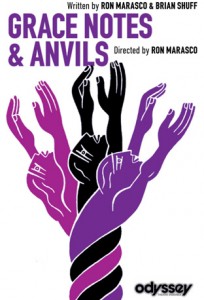TWO CRITICS; TWO STAGED READINGS; BASICALLY ONE OPINION
From Jason Rohrer:
Plays in the Park, Brian Conners’ collection of one-acts (only one of which is set in a park), intends to showcase its writer (who also directs) in the glow of its rotating cast of Actors’ Studio headliners. Mark Rydell, Ed Asner and Esai Morales performed that function on opening weekend (George Segal replaces Mr. Asner this week); none showed more than a passing familiarity with the material, and all were shown up by the less famous cast members, who mostly did memorize their parts. One, though, acted as if she had real business being on that stage: Dahlia Waingort, who played opposite Mr. Morales and who brought a real actor’s fervor that infected her partner, although it could not teach him his lines.
A staged reading’s a nebulous thing. If people read onstage, even if they stay seated on a “set” indicated by a couple of benches and whatever black curtain the theater provides, is it still considered “staged?” And even if they do follow some sort of blocking, if they’ve got scripts in hand, it still isn’t really a show, is it?
And so, how arrogant it seems to charge admission to watch someone read. This new trend deserves a short rope and a short drop. Traditionally, and appropriately, you beg people to come to readings; you bribe them, even. You don’t charge. When your writing is in a nascent stage, you invite writers, directors, actors if you must: people who might have some valuable professional input. When your writing is as good as you can make it, you gather your best available cast and you rehearse it and you do an angel reading for potential backers. But at no point do you invite the public. Or a critic.
* * * * * * * *
From Tony Frankel:
 I stopped by The Odyssey to visit Grace Notes and Anvils, based on Ron Marasco and Brian Shuff’s book, “About Grief: Insights, Setbacks, Grace Notes, Taboos.” The two adapted the book for what the L.A. Times called, “a specialty hybrid of staged reading, topical symposium and group therapy session.” That may be accurate, but is it theater just because it occurs on a stage? How does a critic approach just such a staged reading? What is he to say when the set is a table with three chairs, the lights remained at the same level for 85 minutes, and the cast never stood up as they read from the script? Perhaps something in the vein of: “The muted colors on the coffee mugs were appropriate for the somber occasion.”
I stopped by The Odyssey to visit Grace Notes and Anvils, based on Ron Marasco and Brian Shuff’s book, “About Grief: Insights, Setbacks, Grace Notes, Taboos.” The two adapted the book for what the L.A. Times called, “a specialty hybrid of staged reading, topical symposium and group therapy session.” That may be accurate, but is it theater just because it occurs on a stage? How does a critic approach just such a staged reading? What is he to say when the set is a table with three chairs, the lights remained at the same level for 85 minutes, and the cast never stood up as they read from the script? Perhaps something in the vein of: “The muted colors on the coffee mugs were appropriate for the somber occasion.”
Each week, one of the playwrights appears alongside alternating guest actors. At my performance, the strikingly handsome Ricardo Molina and the luminescent actress Jenny O’Hara appeared alongside Mr. Marasco, who also directed—or rather, didn’t direct.
The profundity of the event may be in direct correlation with how recently you lost someone, and while I was happy for the very few audience members who were actively sobbing, I couldn’t get past the sameness of the event. Nor could I get past Mr. Molina’s inability to read directly from a script and say his lines correctly. In fact, he flubbed so many lines, and the show was so void of imagination, that to charge admission to the public (many of whom no doubt expected a show) seems brazen. As a result of Mr. Molina’s messy and poorly-acted line-readings, even the transplendent Ms. O’Hara and the over-rehearsed but appealing Mr. Marasco stumbled on some dialogue. When that happened, Ms. O’Hara would gently set her hand on another actor’s wrist with authentic love emanating from her eyes, as if to say, “No worries. We have a higher purpose here.”
This well-intentioned evening aims to educate the audience in the fine art of grieving via quotes and “Chicken Soup for the Soul”-type yarns—and there are indeed some genuine nuggets of wisdom. The press release calls it “using the intimacy of the theater,” but it feels like a PBS fundraiser, one which so readily strikes a common chord that the pledge phones should be ringing off the hook. Sure, it’s intimate like a TV screen, but it isn’t really a show. Our money is already pledged via ticket sales, but there is no switching the channel should you be less than enthused. At least I have a few tips on how to grieve for staged readings as theater, should they ever die.
Plays in the Park
presented by Key Schott Productions at The Santa Monica Playhouse
scheduled to end on August 12, 2012
for tickets, visit http://www.plays411.com/playsinthepark
Grace Notes & Anvils
The Odyssey Theatre in Los Angeles
scheduled to end on July 29, 2012
for tickets, call 310.477.2055 or visit http://odysseytheatre.com
